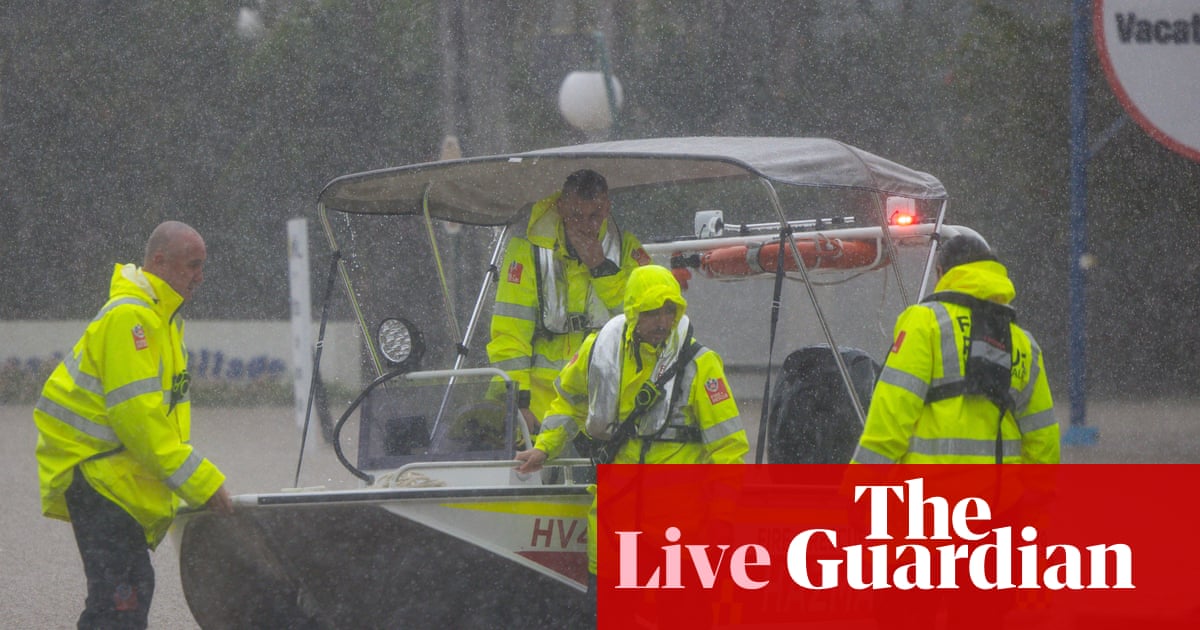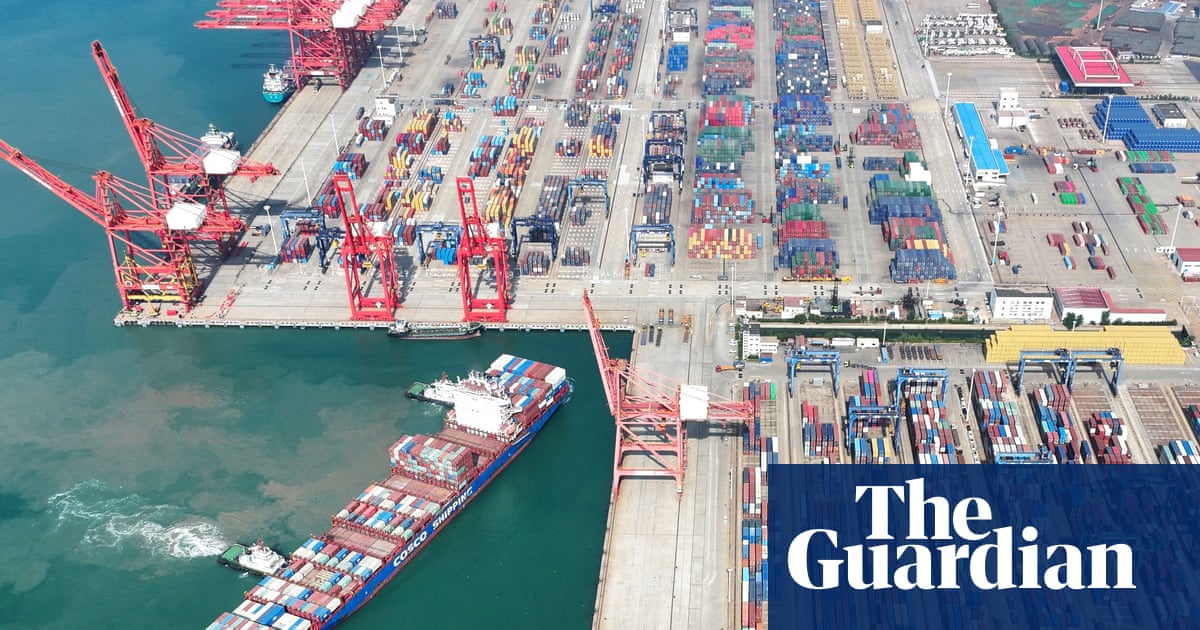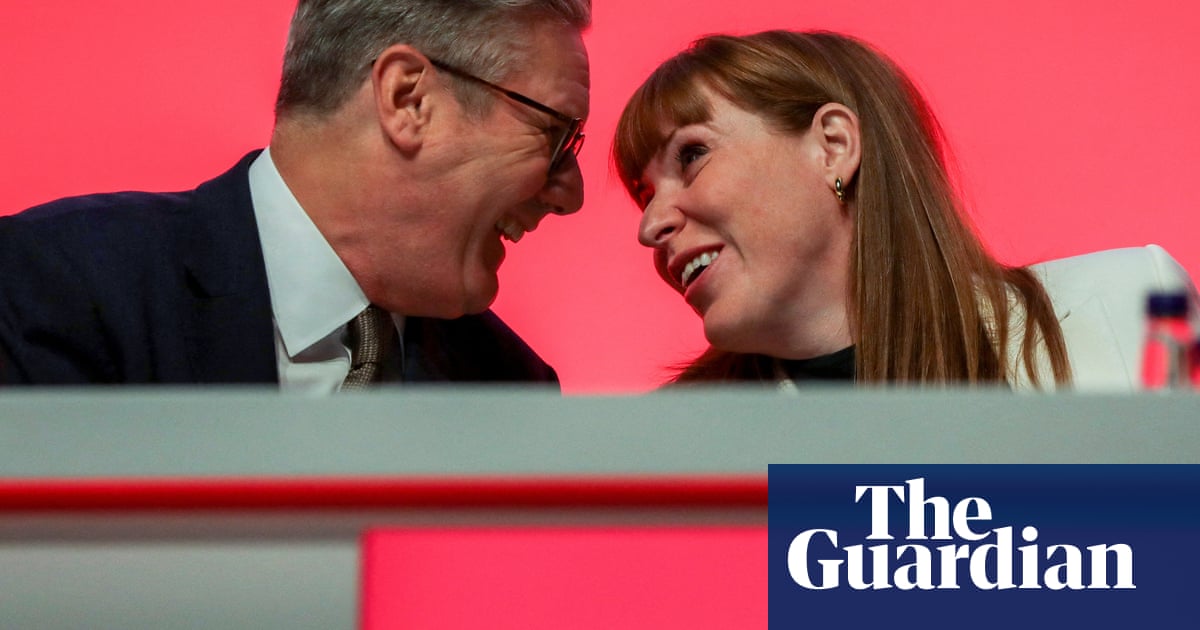Ukraine’s Zelenskyy urges Europe to step up and not only look up to the US
Ukrainian president Volodymyr Zelenskyy is now speaking in Davos, and he is asking the audience to turn the question of “what will Trump do” around and consider what Europe should do to establish itself as a global player instead.
In a strongly worded and sobering wake up call addressed to European leaders, Zelenskyy said:
Most of the world is now thinking: What is going to happen to our relationship with America, what will happen to alliances, to trade? How does President Trump want to end war? … But no one is asking these kind of questions about Europe.
When we in Europe look at the US as our ally, it is clear they are an indispensable ally. In times of war, everyone worries will the US to stay with them. … But does anyone in the US worry that Europe might abandon them one day or might stop being their ally? The answer is no.
…
Will President Trump even notice Europe? Does he see Nato as necessary, and will he respect EU institutions?
…
Europe cannot afford to be the second or third in line for their allies. If that happens, the world will start moving without Europe and that is a world that would not be comfortable or beneficial to all Europeans.
…
Europe must establish itself as a strong, global player, as an indispensable player. Let’s not forget there is no ocean separating European countries from Russia and European leaders should remember these battles involving North Korean soldiers are now happening in places geographically closer to Davos than Pyongyang.
…
Right now, it is not clear whether Europe will even have a seat when the war against our country ends. And we see how much influence China has on Russia.
We are deeply grateful to Europe for all the support … but will President Trump listen to Europe, or will he negotiate with Russia, China, without Europe?
Europe needs to learn how to fully take care of itself, so the world cannot afford to ignore it.
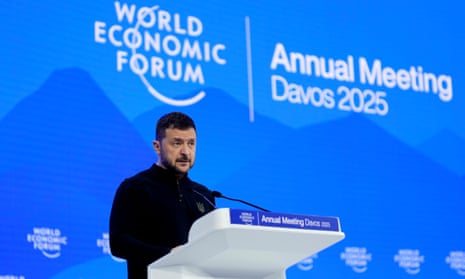
Key events
You can’t just help yourself to Greenland, Danish foreign minister tells Trump
Denmark’s foreign minister Lars Løkke Rasmussen dismissed Donald Trump’s suggestions that the US could try to take over control over Greenland.
“Of course we can’t have a world order where countries, if they’re big enough, no matter what they’re called, can just help themselves to what they want,” he said.
Løkke said he was particularly concerned about the broader “rhetoric” of the new president, who spoke about expanding the US territory.
Danish media reported that a series of emergency talks with key politicians and business leaders were called throughout the day on Tuesday as the country’s government was considering its response to Trump’s comments on “wonderful” Greenland, which we reported in full this morning.
There is a perhaps slightly unexpected European angle to Trump’s plans on deporting undocumented immigrants from the US (see our live US blog for the latest).
Polish prime minister Donald Tusk was asked earlier today about the impact this policy could have on some Polish citizens who live in the US.
Various estimates suggest there are up to 10 million Americans with Polish roots, making it the largest Polish diaspora globally. It is not known how many of them could have irregular migration status, with some suggestions published by the Gazeta Wyborcza daily the number could be in tens of thousands.
“Every Polish man and every Polish woman will be warmly welcomed here at home,” Tusk told reporters in Warsaw, adding that in Poland “everyone can find their own America”.
The Polish ministry of foreign affairs also published a related statement, in both Polish and English, urging Poles abroad to consider making it their “New Year’s resolution” to return to the country.
“Unless they have renounced their Polish citizenship, all Poles are entitled to a Polish passport, and to repatriate themselves and settle freely in Poland,” it said.
UK refuses to directly criticise Trump for pulling out of the Paris agreement and the WHO
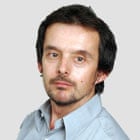
Peter Walker
In stark contrast to some European reactions, the UK has refused to directly criticise Donald Trump for pulling the US out of the Paris climate agreement and the World Health Organisation, in an early indication of the cautious approach to the new administration being taken by Keir Starmer’s government.
Asked about the Paris decision, Starmer’s official spokesperson – who by UK political tradition is not named in the media – said was “not going to give a running commentary on every executive order or decision made by President Trump and his administration”. When asked about the WHO he gave the same response.
Pressed on the subject, the spokesperson said the UK’s position on both the Paris deal and WHO had not changed, and that it was a strong supporter of both.
Asked if the reluctance to criticise Trump was due to fear of him becoming angry, he denied this.
Zelenskyy calls for ‘more voices’ to get to Trump to counter disinformation, pro-Russian messages
In the Q&A after his speech, Zelenskyy was asked for his view on Ukraine’s prospects in the third year of war with Russia and whether he believed the new US president Donald Trump could try to bring the conflict to a negotiated end.
The Ukrainian president insisted that he and his team had “good relations” with Trump, but also delicately raised some concerns about who is getting the president’s ear.
We now live in times [that call] for pragmatism. It is very important for us that [when there are] some more excessive [radical] voices around President Trump, delivering disinformation or pro-Russian messages, … that Europe speaks loudly so there are more voices getting to Trump and he clearly understands the details and potential future risks.
He added that, in principle, he agreed with Trump’s stated intention of ending the war this year.
I told him, we are your partner, this war is in our territory, … we understand how painful it is. We want to end the war this year.
But he said any peace deal would have to be “just,” even if it takes longer to negotiate it, so that it is lasting so “Ukrainians [will] be able to come back home, to live in security, to work.”
It seems to be that is the most important thing, and we will be doing everything to achieve this.
Europe needs ‘new, bolder’ approach to tech, Zelenskyy says
Turning to economy, Zelenskyy said Europe needs to change its approach to regulating digital services and innovation or risks falling behind the US and China.
In a particularly cutting remark, he said Europe “deserves to be more than just a bystander, with its leaders reduced to hosting on X after an agreement has already been made.”
We need a completely new, bolder approach to tech companies and technological development. If we lose time, Europe will lose this century, and now Europe is falling behind in the development of artificial intelligence.
Already TikTok’s algorithms are more powerful than some governments, and the fate of small countries depends more on the owners of tech companies than their laws.
Ouch.
In his comments about how Europe should change its ways to establish itself as a global power, Zelenskyy very pointedly called out Slovakia’s prime minister Robert Fico for seeking Russian gas deliveries via Turkey, and not alternative routes such as imports from the US, while still hoping to benefit from the “US security umbrella.”
The tensions between the pair spiralled over the last few weeks since Fico’s controversial visit to Moscow and focused on Ukraine’s decision to stop transit of Russian gas through its territory. At one point, the Slovak leader even threatened to oppose further EU support for Ukraine.
Zelenskyy took aim at Fico in his comments saying further:
Things are on our side. President Trump is going to export more energy, but Europe needs to step up and do more long-term work to secure real energy independence.
[But] you cannot keep buying gas from Moscow while also expecting security guarantees and help … from Americans. That is just wrong.
Just a reminder that his comments come just as the Slovak parliament is preparing to hold a confidence vote for Fico’s government, called by opposition parties (see 12:58). It is not unreasonable to expect that his words will soon be discussed in Bratislava.
Ukraine’s Zelenskyy urges Europe to step up and not only look up to the US
Ukrainian president Volodymyr Zelenskyy is now speaking in Davos, and he is asking the audience to turn the question of “what will Trump do” around and consider what Europe should do to establish itself as a global player instead.
In a strongly worded and sobering wake up call addressed to European leaders, Zelenskyy said:
Most of the world is now thinking: What is going to happen to our relationship with America, what will happen to alliances, to trade? How does President Trump want to end war? … But no one is asking these kind of questions about Europe.
When we in Europe look at the US as our ally, it is clear they are an indispensable ally. In times of war, everyone worries will the US to stay with them. … But does anyone in the US worry that Europe might abandon them one day or might stop being their ally? The answer is no.
…
Will President Trump even notice Europe? Does he see Nato as necessary, and will he respect EU institutions?
…
Europe cannot afford to be the second or third in line for their allies. If that happens, the world will start moving without Europe and that is a world that would not be comfortable or beneficial to all Europeans.
…
Europe must establish itself as a strong, global player, as an indispensable player. Let’s not forget there is no ocean separating European countries from Russia and European leaders should remember these battles involving North Korean soldiers are now happening in places geographically closer to Davos than Pyongyang.
…
Right now, it is not clear whether Europe will even have a seat when the war against our country ends. And we see how much influence China has on Russia.
We are deeply grateful to Europe for all the support … but will President Trump listen to Europe, or will he negotiate with Russia, China, without Europe?
Europe needs to learn how to fully take care of itself, so the world cannot afford to ignore it.
Scholz says ‘we do not accept’ Musk’s support for extreme right
Germany’s Scholz was also asked about his views on Elon Musk and how Europe should respond to X and Tesla billionaire owner’s recent actions after he endorsed the far-right Alternative für Deutschland ahead of next month’s parliamentary elections in the country.
We have freedom of speech in Europe, and everyone can say what he wants, even if he is a billionaire. What we do not accept is if this is supporting extreme right positions and this is what I would like to repeat again.
‘Nothing about Ukraine without Ukraine,’ Scholz says
Scholz also offered some comments on the importance of continued support for Ukraine, saying that Europe and the West “need to do everything in order to protect and preserve the fundamental principles of the international order.”
The most fundamental principle is the inviolability of borders and, by the way, this holds true everywhere, all over the place. Anyone who challenges this principle, challenges the rules-based order as a whole.
This is why President Putin must not be successful with a war of aggression which he unleashed against Ukraine.
And what is often being overlooked is that so far, he doesn’t have success. Putin wanted to divide Ukraine and the EU and instead it’s an EU accession candidate … He wanted NATO to be divided and weak as possible, and it stands united and has two more members in Sweden and Finland.
He wanted to subjugate Ukraine militarily, and instead the Ukrainian army is much stronger … than before the war, and equipped with Western weapons.
It is first and foremost thanks to the brave people of Ukraine … but also the result of our support. This support is and will remain the path to a true and just peace in Ukraine. …
The men and women of Ukraine will have to have the final say. Nothing about Ukraine without Ukraine.
Germany’s Scholz calls for ‘cool heads’ in response to Trump
German chancellor Olaf Scholz has been speaking in Davos and offered his comments on the new US administration under Donald Trump.
Here is what he had to say:
In a world which due to social media permanently teeters on the brink of a nervous breakdown, we need cool heads. Not every press conference, not every tweet should plunge us into a heated existential debate, and this is also true after the change of government that took place in Washington ….
The US are our closest ally outside Europe and I will do everything for it to remain like that, because it is in our mutual interest and … it is indispensable for peace and security around the globe…
It is absolutely clear that President Trump will keep the world in suspense in the coming years in the fields of energy, climate, trade, foreign and security policy. … He reiterated it yesterday.
We are able and will be dealing with this, without any excitement and indignation, but also without fake cosying up and telling them what they want to hear.
Germany’s Scholz and Ukraine’s Zelenskyy about to speak in Davos
German chancellor Olaf Scholz and Ukrainian president Volodymyr Zelenskyy will be speaking at the World Economic Forum in Davos over the next hour.
You can find a live stream at the top of this page and I will also bring you all the news lines.
German reactions to Musk’s apparent Nazi salute

Kate Connolly
There have so far been muted reactions in Germany to Elon Musk’s apparent Nazi salute delivered at Trump’s inauguration (see 9:34am), which the tech billionaire has indirectly suggested has been deliberately misunderstood, Kate Connolly writes in from Berlin.
Some have called it an indisputable fascist gesture, others have urged caution saying Musk should be persuaded to offer his own explanation.
But Michel Friedman, a prominent German-French publicist and former deputy chair of the Central Council of Jews in Germany has delivered an unequivocal condemnation of the greeting, describing it as a “disgrace”, and arguing in an interview with the daily Tagesspiegel, that by delivering the gesture Musk had shown that a “dangerous point for the entire free world” had been reached.
Friedman, who descends from a family of Polish Jews, hardly any of whom survived the Holocaust, said he had been shocked on watching the inauguration to see the gesture being made, adding that as far as he was concerned it was unambiguously the Nazi ‘Heil Hitler’ salute, despite attempts to downplay it.
“I thought to myself, the breaking of taboos is reaching a point that is dangerous for the entire free world. The brutalisation, the dehumanisation, Auschwitz, all of that is Hitler. A mass murderer, a warmonger, a person for whom people were nothing more than numbers – fair game, not worth mentioning.”
The gesture was a sign for Friedman of the extent to which “democracy in the US is in danger,” he said.
Almost all of Friedman’s family died in the German Nazi Auschwitz-Birkenau extermination camp. Only his parents and his grandmother were saved, thanks to the Sudeten German entrepreneur Oskar Schindler.
Musk made the gesture as a speaker on stage before Donald Trump’s arrival in Washington’s Capital One Arena yesterday. He heartily thanked Trump supporters before holding his right hand on his heart and stretching it in a sharp and quick upwards movement. Then he turned around and repeated the gesture in the other direction, saying: “My heart goes out to you”.
The billionaire later responded to criticisms of his behaviour on his social media platform X, saying that “the ‘everyone is Hitler’ attack is sooo tired,” adding a sleeping emoji at the end of his post.
Our Madrid correspondent Sam Jones reported earlier about the confusion caused in Spain by Trump’s incorrect claims that it belongs to the Brics group of countries (chiefly Brazil, Russia, India, China, South Africa), and could face 100% US tariffs on its products.
Asked by a reporter about low defence spending by some European NATO allies like Spain and France, Trump said for Spain it was “very low,” but then suggested the country was part of the Brics bloc, making the confused journalist go “what?!”.
“You know what a Brics nation is? You will figure it out,” he said.
He’s probably still trying to figure it out this morning.
Slovak government faces confidence vote – context
As reported earlier, I am keeping an eye on Slovakia today where opposition forces launched an attempt to dismiss the leftist-nationalist government of Robert Fico, accusing the prime minister of laying the groundwork to take the country out of the EU.
Fico has sought to maintain relations with Russia during the war in Ukraine, meeting with Vladimir Putin last month, and halted official military aid to Kyiv. He has also repeatedly criticised sanctions on Russia and escalated a rift with Kyiv after Russian gas supplies through Ukraine stopped at the end of 2024.
Despite growing concerns about his government’s foreign policy direction, Fico sparked further controversies by saying that Slovakia needed to prepare for “all possible crisis situations” which the EU could face in the short term, suggesting even a break-up of the bloc.
“This cannot be read in any other way than… what we had warned of: that the government of Smer is preparing the ground for leading Slovakia out of the European Union,” Michal Šimečka, leader of the Progressive Slovakia party, told parliament earlier today.
Reuters notes, however, that the opposition’s effort were likely to fail as the government’s slim majority in parliament was expected to back Fico.
I will bring you further updates on this during the day.
Trump’s Paris agreement withdrawal ‘truly unfortunate’ or even ‘fatal’, EU and Germany say
The EU’s climate commissioner Wopke Hoekstra has described Donald Trump’s decision to withdraw the US from the Paris agreement as “truly unfortunate” while warning of the “potentially catastrophic” reality of a warmer world.
In a statement, Hoekstra said:
It’s a truly unfortunate development that the world’s largest economy, and one of our closest allies in the fight against climate change, is withdrawing from the Paris Agreement.
Despite this setback, we remain committed to working with the US and our international partners to address the pressing issue of climate change. The science is crystal clear: every incremental increase in global temperatures will come with enormous costs, economically, socially but also in human lives.
A planet with rising temperatures, more frequent natural disasters, and unpredictable weather patterns will be a costly, and potentially catastrophic, reality.
The Dutch commissioner represents the EU in UN climate talks and oversees the bloc’s emission reduction targets.
Earlier this morning, outgoing German vice-chancellor Robert Habeck described Trump’s decision as “fatal” and insisted Germany and Europe should continue on the path of expanding low-carbon energies.
“We have to bring our own technologies to the fore,” he told a Handelsblatt annual energy conference in Berlin.
Separately, Francois Villeroy de Galhau, the governor of the Banque de France and a senior official European Central Bank, said that the institution also “regrets” the announcement, but he accepted it was “not a surprise.”
Von der Leyen’s Davos speech – snap reaction

Jennifer Rankin
Ursula von der Leyen has said the Paris climate agreement “continues to be the best hope for all humanity” in a speech aimed at showcasing Europe’s alternative approach to Donald Trump’s nationalist transactional politics, our Brussels correspondent Jennifer Rankin writes in.
Speaking one day after Trump ordered the US to pull out of the landmark climate agreement, the head of the European Commission said all continents would have to speed up the transition towards net zero to “deal with the growing burden of climate change” as she referred to heatwaves across Asia, floods in Brazil and Indonesia, and wildfires in Canada, Greece and California.
Having had warm relations with Joe Biden, von der Leyen faces an uphill task dealing with the Trump administration, which scorns EU preferences for free trade and multilateralism, while cosying up to Hungary’s prime minister Viktor Orbán, who is in conflict with Brussels over the rule of law.
But she also made overtures to the new administration, following Trump’s recent threat of “TARIFFS all the way!!!” if Europe failed to buy more American oil and gas.
Von der Leyen said Europe and the US did €1.5tn of trade, around 30% of the global total and “a lot is at stake for both sides”. She went on: “Our first priority will be to engage early, discuss common interests and be ready to negotiate.”
This was von der Leyen’s first speech to Davos since starting a second five-year term as Commission president. How she responds to the climate crisis, handles the erratic US president and maintains support for Ukraine (see 11.34) will define her legacy.
While she promised to stay the course on climate action, the speech also focused on European competitiveness and her plans for removing what she called “unnecessary red tape”, specifically by “simplifying” rules on sustainable finance and due diligence.
Von der Leyen, a German Christian Democrat, is under pressure from her own centre-right European People’s Party to go further, by rethinking elements of the Green deal agreed during her first mandate, such as fines on carmakers that fail to meet emission-reduction targets.
As of Monday von der Leyen had yet to fix a date to meet the president, according to her spokesperson.
EU officials have already been readying retaliatory tariffs should negotiations fail. In public officials hope for the best; in private they prepare for (what they see) as the worst.
Now for something lighter… If you found yourself a bit impatient at times during Trump’s 2,885-word inauguration speech last night – twice longer than the one he delivered in 2017 – you were not alone.
In an absolute classic of the genre, an interpreter working for the German TV channel phoenix seemingly forgot to switch his microphone off as he turned to the producer and asked, “how long do you want to stay on this shit?”.
When asked about the incident by the German news agency dpa, the broadcaster said it was a “technical glitch,” and that comments did not reflect its view on Trump’s speech.
Obviously not.








